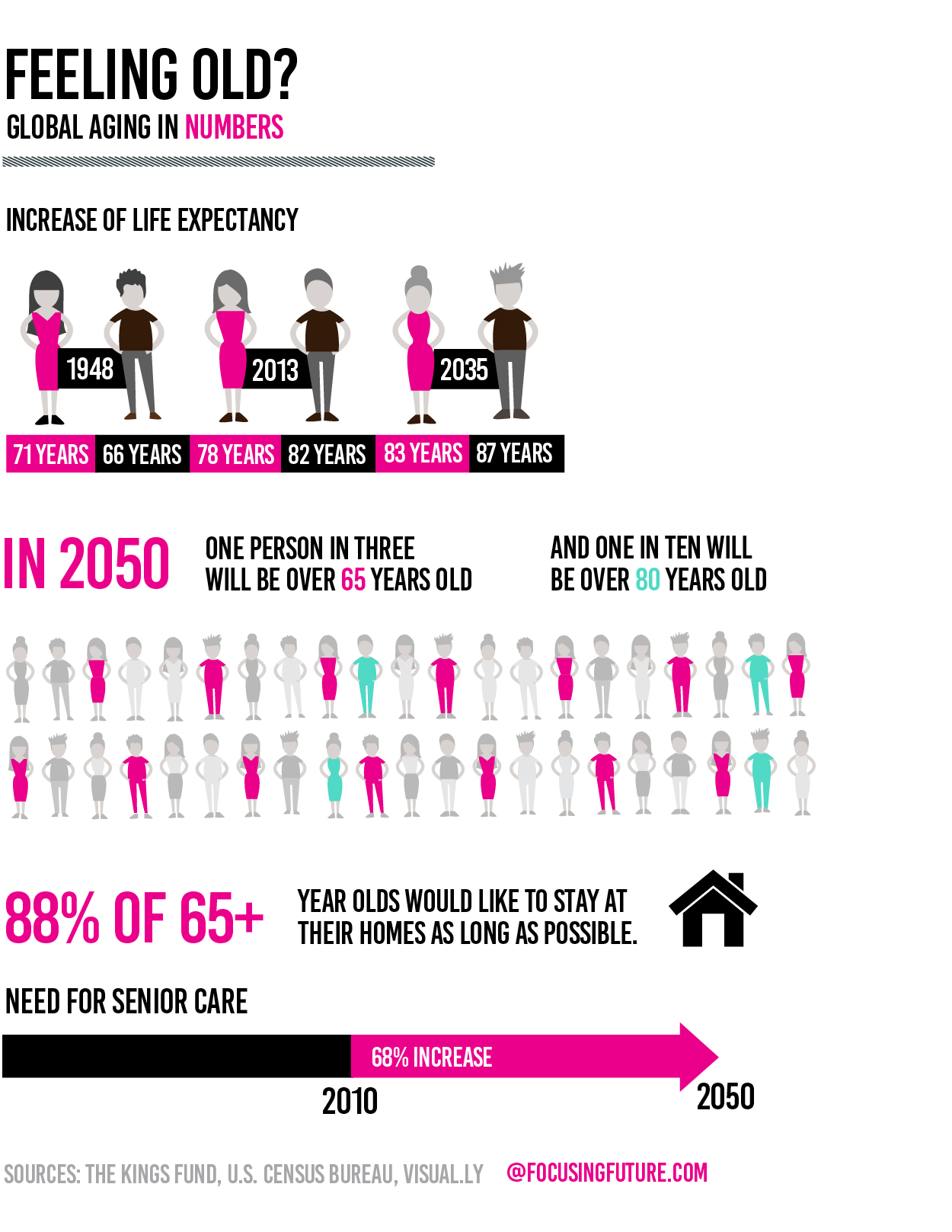![]() 5 minute read
5 minute read
Global age shifting is not a newly developed piece of news. Cambridge researcher Aubrey de Grey addresses aging as a disease that can be cured. “Aging is a side effect of being alive” – as Aubrey puts it. Does humanity succeed of finding the cure for aging? And how does it influence our living?
Forget the feeling
of being old
Longevity turns out to be one of the biggest challenges of 21st century. Humanity has witnessed the increase in life expectancy since 1800 due to improvements in public health, diet, environment and other factors. One of the biggest impact factors is the development of medicine. In 2050, 22% of world’s population will be over 65 years old. 11% will be seniors over 80 years old.

According to research at the Albert Einstein College of Medicine, human lifespan has already reached its peak of 125 years. Researchers combined and analysed data from more than 40 countries from Human Mortality Database and Human Mortality Database. They argue that the maximum longevity has been gained, but lifespan expectancy will continue to grow. Dr. Jan Vijg believes that “further progress against infectious and chronic diseases may continue boosting average life expectancy, but not maximum lifespan.”
Extending human
life expectancy
While the maximum longevity is set at 125 years, there is space to improve life expectancy. Advances in bionic and synthetic biology can take over in the fight for prolonging lifespan. Innovations in biotechnology soon will make it possible to modify DNA. Adjustment of the source code of life itself allows humanity to extend life through a variety of means.
Moreover, growing new cells and bioprinting will allow substituting body organs that no longer perform. The goal is to be able to produce, bioprint, the whole new body organ. For example, some estimate that with the pace of nowadays innovation in medicine, in the future it would take 3 hours to grow a new liver. Which in other words means that it will take 1,690, 912, 929, 600 hours to print a liver for every human. Besides, some body organ does not necessarily have to be printed. The artificial heart is a pump inserted in the chest substituting the heart itself. A human might be turning artificial to extend lifespan towards immortality.
Aging in place
88% of 65+ years olds would prefer to live at home as long as it is possible. The U.S. Centres for Disease Control and Prevention defines aging in place as “the ability to live in one’s own home and community safely, independently, and comfortably, regardless of age, income, or ability level.” This fact creates a couple of new markets, services, and new paths for innovations.
To begin with, let’s look at the nursing services for elderly. When a senior is alone at home, someone has to provide care and assistance. The demand for caregivers will rise in the 21st century. Simultaneously, some jobs will be substituted by robot-caregivers. According to trends and statistics, there will be more and more seniors in the world. Consequently, while in megacities, living space will shrink, homes for people 65+ have to become more secure and comfortable for elderly. There might be new elderly micro areas. Or, vise verse, families will stick together and share living space with children and parents.
Homes will change functionalities as well. New digital solutions like wearables and Internet of Things will transform the care for children and elderly. Smart[nbsp]Home functional will be oriented to take care of the people spending most of their time indoors.
Nowadays, there are digital bracelets that can call the ambulance, or notify responsible person for changes in the health parameter of the senior with a bracelet. In real life situation, daughter or son will get a notification if their parent falls down at home. This technology gives a[nbsp]stronger feeling of security and control. In addition, constantly measuring health data gives an[nbsp]impact for doctors and healthcare development.Morever, longevity will change the attitudes on what exact age is person recognised as old. Moreover, longevity will change the attitudes on what exact age is person recognised as old.
Economic
impact
Economic weight of baby boomers retirement lays on millennials shoulders in the USA. This implies that there are more elderly than a working class. Millennial or Gen Z have to perform twice as much at work comparing to what it was in last century. Moreover, economic and environmental instability is way more abundant on the new generations. The increase of elderly population worldwide requires a change in policy and budget distribution. Some countries examine the possibility to increase the retirement age; some subsidize the elderly care services. Surely, putting this responsibility on the youth might stress new generation making them less productive.
It is important to remember that elderly has a numerous weight and voting powers. Brexit is one of the examples of the power of elderly. Mostly the 50+ years olds voted for leaving EU, while new generation did not show up for election at all or voted to stay in the union. What can be the economic solution for a demographical shift? And how will it be solved politically?




